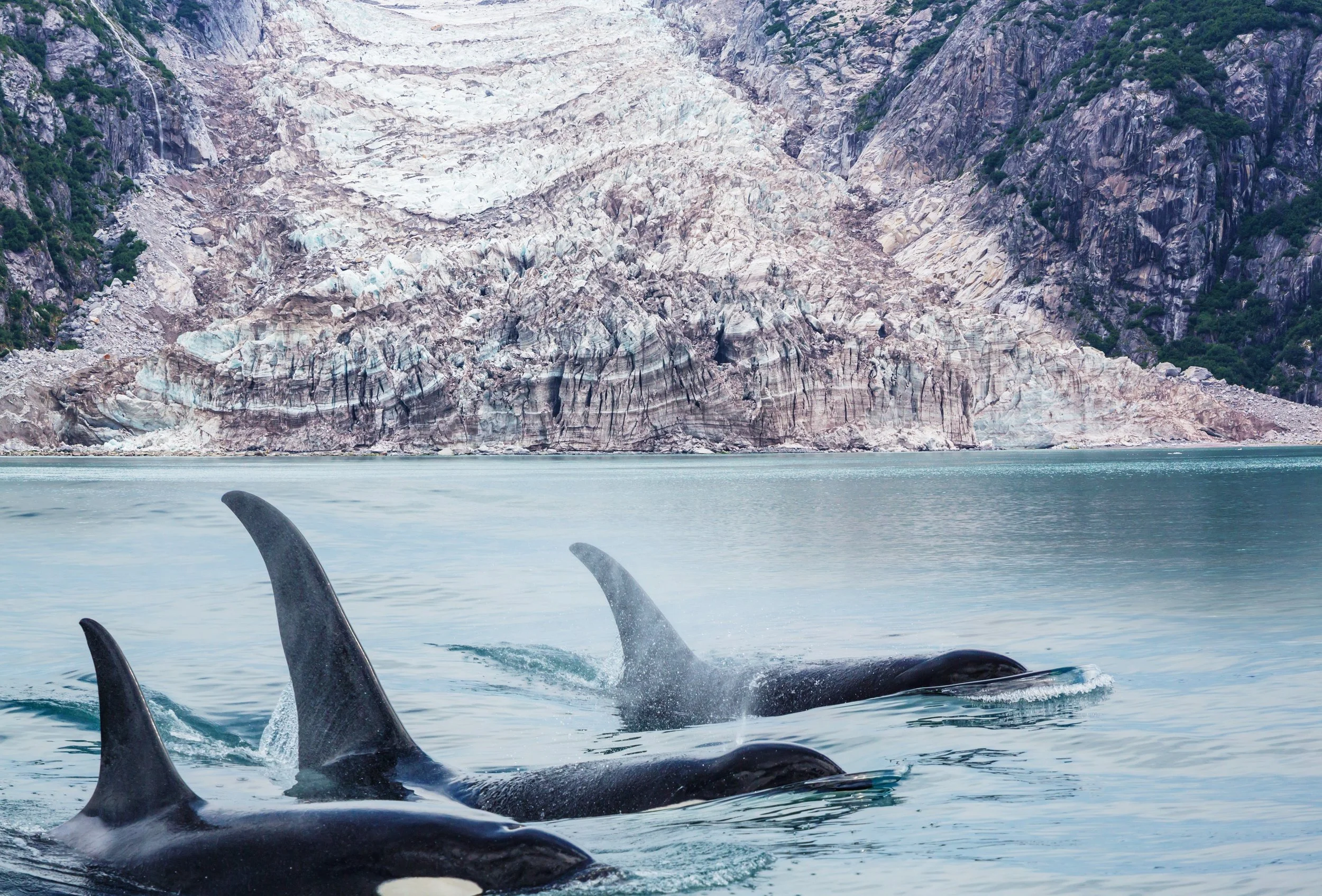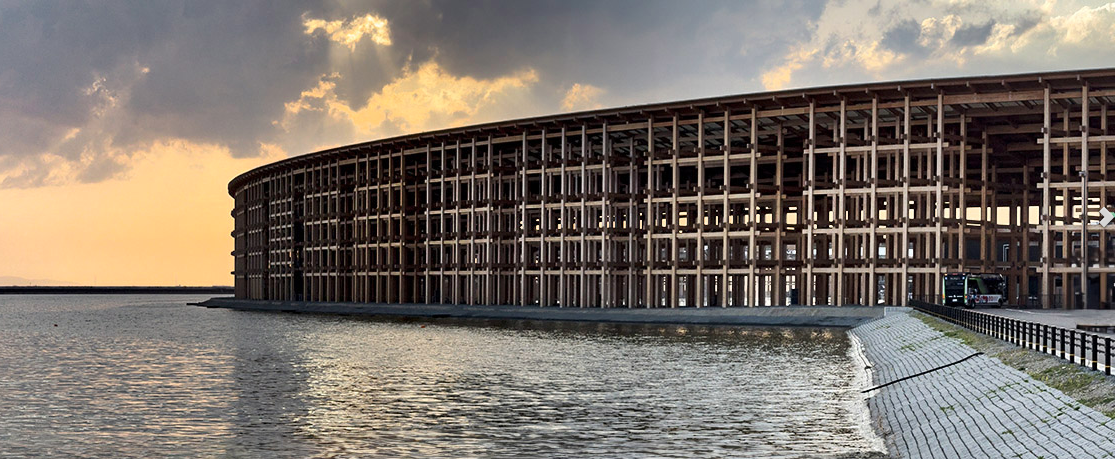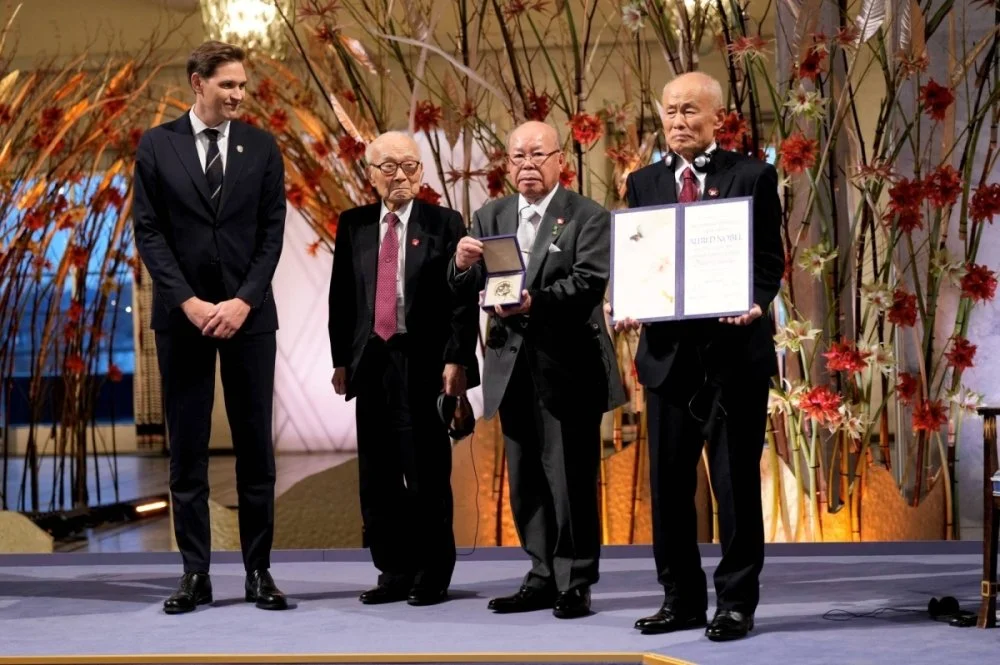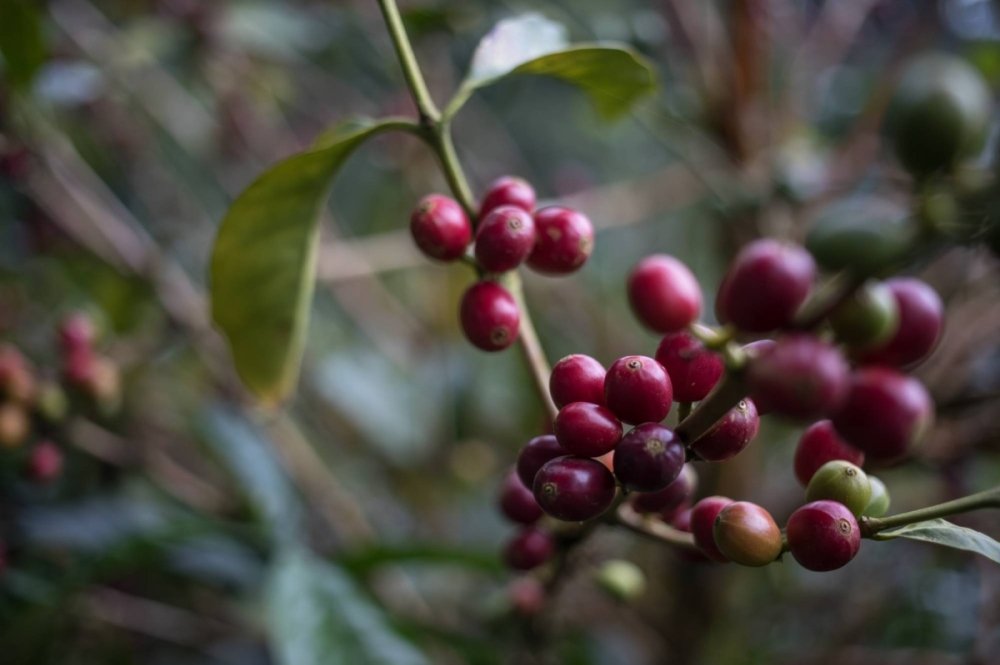Killer Whales Use Seaweed to Help Each Other
Killer whales are very smart animals. They live in groups and talk to each other in special ways. Now, scientists have seen something new — these whales use seaweed to clean and help each other.
Researchers used drones to watch killer whales in the Salish Sea, between the U.S. and Canada. They saw the whales using a type of seaweed called bull kelp. The whales bite the kelp, break off a piece, and roll it between their bodies and a partner whale. This action is called "allokelping".
This is special because it is a kind of tool use, which is rare in the ocean. Most animals use tools to get food, like chimpanzees using sticks to catch termites. But killer whales are using kelp for social grooming — like saying, "You help me, I help you."
Scientists think the behavior helps two things:
Skin care – Kelp may help remove old skin or stop infections.
Friendship – It helps whales feel close to each other, like a hug.
World Expo 2025
What is the purpose of an Expo, and who decides where it happens?
A World Expo is a global event where countries come together to share ideas, show innovations, and explore solutions to world problems. It helps promote international cooperation, education, tourism, and future thinking.
The location of each Expo is decided by the Bureau International des Expositions (BIE). Countries submit bids to host the event, and BIE member nations vote to choose the winner. The chosen host then plans and builds the Expo site and invites the world to take part.
Introduction
Expo 2025 Osaka – officially the World Expo 2025 – is taking place from April 13 to October 13, 2025, on Yumeshima, a reclaimed island in Osaka Bay. The theme is “Designing Future Society for Our Lives”, encouraging visitors to think about the future of technology, health, and sustainability. It’s the second time Osaka has hosted a World Expo, following the famous 1970 event.
Size and Visitors
The site covers about 155 hectares, roughly the size of 217 football fields. Organizers expect around 28 millionvisitors over six months . However, as of early July, only about 9 million tickets have been sold—well below the target of 14 million advance ticket sales.
Main Attractions
1. Grand Roof Ring
o A wooden circular structure that loops around the Expo grounds. It’s 2 km long and 20 m high—the largest wooden architecture in the world .
o It offers shade and scenic views during a 30–40 minute walk .
2. Pavilions
o 188 pavilions are open, representing over 160 countries, regions, and international organizations .
o Country pavilions include the U.S. (space travel), Ukraine (a moving wartime exhibit), Jordan (real desert sand), Thailand, Ghana, and Japan .
o There are also private and corporate pavilions such as Panasonic’s “Nomo no Kuni”, NTT’s “Natural” pavilion, and a Gundam pavilion by Bandai Namco .
o Note: No extra tickets are needed for pavilions, but some require advance reservation or lottery.
3. Future Society Showcase
o Visitors can explore advanced technologies like flying cars, autonomous electric buses, AI translation systems, and personal guide apps .
Japan's Atomic Bomb Survivors Win Nobel Peace Prize
The group Nihon Hidankyo, which represents survivors of the Hiroshima and Nagasaki atomic bombings, accepted the Nobel Peace Prize in Oslo, Norway, on Tuesday. They called for countries to get rid of nuclear weapons, which are becoming a bigger threat 80 years after the bombings.
One of the leaders of the group, 92-year-old Terumi Tanaka, survived the Nagasaki bombing. He urged governments to take action to create a nuclear-free world.
The ceremony happened at a time when nuclear weapons are again being talked about as a danger. Russia, which has the most nuclear weapons in the world, has made threats to use them during its war in Ukraine. Recently, Russia fired a new type of missile capable of carrying a nuclear warhead, though it did not use a nuclear payload.
Nihon Hidankyo works to ban nuclear weapons by sharing stories from survivors, called hibakusha. The 1945 bombings killed 214,000 people and led to the end of World War II.
Terumi Tanaka's Story
Tanaka was 13 years old when the bomb hit Nagasaki, just 3 kilometers from his home. He was upstairs reading when he saw a bright flash and felt an explosion. He ran downstairs but fainted when glass doors fell on him.
Later, he and his mother searched for relatives. From a hill, they saw the entire city destroyed and blackened. They found many wounded people and burned bodies. Tanaka and his mother had to cremate his aunt’s body themselves. He said he felt numb and unable to process what had happened.
The Nuclear Threat Today
There are about 106,800 hibakusha still alive, with an average age of 85. Tanaka says their efforts have helped create a “nuclear taboo,” discouraging the use of these weapons. However, 12,000 nuclear warheads still exist, and 4,000 are ready to be launched.
A 2017 U.N. treaty banning nuclear weapons was signed by 122 countries, but no nuclear-armed nations have agreed to it. Nine countries currently have nuclear weapons: the U.S., Russia, China, Britain, France, India, Pakistan, North Korea, and Israel (unofficially).
The head of the Nobel Committee, Jorgen Watne Frydnes, warned that modern nuclear weapons are far more powerful than those used in 1945. A nuclear war could kill millions, injure more, and cause severe climate damage.
The Nobel Peace Prize ceremony was separate from the other Nobel awards, which will be presented in Stockholm.
Geisha Coffee: Japan’s Luxury Brew
Geisha coffee has become a favorite in Japan's growing specialty coffee scene. Known for its unique and complex flavors, this rare coffee variety offers notes of jasmine, citrus, green tea, and honey. Each sip is an experience, with the flavors changing as the coffee cools.
Originally discovered in Ethiopia, Geisha coffee gained fame in 2004 when a Panama farm sold it for a record price. Its popularity has since spread worldwide, especially in Japan. Many cafes in Tokyo, like Geshary Coffee and Leaves Coffee Roasters, now focus on serving this premium coffee. They also share the story behind each cup, from the farm to the brewing process.
Japan’s coffee lovers value Geisha for its delicate flavors and high quality. Cafes carefully roast and brew each cup, ensuring it tastes perfect. Some also experiment with new techniques, like fermenting beans with fruit, to create exciting new flavors.
Whether it’s the rich history, the careful preparation, or the incredible taste, Geisha coffee is more than a drink—it’s an art. In Japan, it’s a way to connect over something truly special.
Finally Snow for Mt. Fuji
Snow has finally fallen on Mount Fuji, Japan’s iconic volcano, after a record-breaking delay. Usually, the mountain's snowcap starts forming around early October, but this year, warm weather pushed back the first snow cover to a later date than ever recorded. Photos taken on Wednesday showed a light dusting of snow on the peak, offering the first glimpse of winter on Japan's tallest mountain. The national weather agency in Kofu, Yamanashi Prefecture, hasn't officially confirmed this year’s record-breaking late snowfall due to ongoing cloud cover at their monitoring station.
Experts cite global warming as a major reason for the delay, with higher-than-average temperatures recorded on Mount Fuji this October. Japan recently experienced one of its hottest summers, which likely contributed to the snowless slopes. The volcano, a UNESCO World Heritage Site, typically sees snow for most of the year, attracting thousands of visitors who climb its 3,776-meter summit to catch the sunrise. Mount Fuji's snowcapped silhouette has inspired countless artworks, including Katsushika Hokusai's famous woodblock print, "The Great Wave."
Japan’s Snap Election
Japan held a snap election on October 27, 2024, shortly after Shigeru Ishiba became the new Prime Minister. Ishiba called the election to gain support after replacing Fumio Kishida, who stepped down because of low approval ratings and a corruption scandal.
The election did not go well for the ruling Liberal Democratic Party (LDP). For the first time in years, the LDP and its partner Komeito lost their majority in the House of Representatives. The LDP ended up with only 191 seats, one of its worst performances ever. On the other hand, the opposition party, the Constitutional Democratic Party (CDP), won 148 seats, its best result so far. Smaller parties also gained more seats, showing that voters are looking for new options.
This election reflected the public’s frustration with rising prices, food shortages, and government scandals. Now, Prime Minister Ishiba faces a tough task in finding new allies to keep his government running smoothly.
Japan's Tourism Dilemma: Hotels Becoming Too Expensive for Locals
Oct 22nd Level B1
In recent years, Japan has seen a big increase in international tourists. Many visitors are drawn to famous places like Kyoto, Tokyo, and Osaka. Hotels and guesthouses are often fully booked, especially during holiday seasons and events. As a result, the prices for accommodation have gone up. While this is good for businesses and tourism, it creates a problem for Japanese residents who want to travel within their own country. They are finding it harder to book affordable rooms, as hotels prioritize tourists who are willing to pay higher rates.
This situation has led to complaints from locals who feel they are being "priced out" of their own travel destinations. Some Japanese families now avoid visiting popular areas because the costs are too high. Additionally, hotel owners prefer international guests because they often stay longer and spend more money. The government faces a challenge: it must balance promoting tourism with making sure that travel remains accessible for Japanese residents. Without this balance, more locals may choose not to travel, which could affect the economy in other ways.
Oct 18th, 2024
Hope Grows for Recognition of Artists Behind Hiroshima Bombing Paintings
KAWAGOE, Saitama — People are hoping for more attention to be given to a couple, Iri and Toshi Maruki, who painted large works showing the impact of the atomic bombing of Hiroshima. This comes after Nihon Hidankyo, a group representing atomic bomb survivors, won the 2024 Nobel Peace Prize.
The Marukis, from Higashi-Matsuyama in Saitama Prefecture, went to Hiroshima shortly after the bombing to help survivors. Their time there inspired them to create a series of 15 folding panels called The Hiroshima Panels. These paintings capture the suffering caused by the bomb and the horrors of war.
Their first set of panels toured 160 locations in Japan from 1950 to 1953 and was later shown in at least 20 other countries. Their work was praised internationally, with some comparing it to powerful anti-war art by Francisco Goya and Pablo Picasso. In 1995, Lawrence Wittner, a professor at the State University of New York, even recommended the couple for the Nobel Peace Prize for their contribution to peace through art.
Although the Marukis didn’t win the prize, Toshi Maruki expressed gratitude for the nomination, calling it an honor. Today, 14 sets of The Hiroshima Panels are on display at the Maruki Gallery in Higashi-Matsuyama, while the 15th set can be seen at the Nagasaki Atomic Bomb Museum.
Yukinori Okamura, the gallery’s curator, said that with Nihon Hidankyo’s Peace Prize win, he hopes the public will re-evaluate the importance of artists and others who have worked to show the damage caused by nuclear weapons. He also hopes that works like The Hiroshima Panels will gain more recognition as symbols of peace and remembrance.
Nobel Peace Prize to Nihon Hidankyo
B1 level Oct 11, 2024
Japan’s Nihon Hidankyo, an organization made up of atomic bomb survivors from Hiroshima and Nagasaki, has been awarded the 2024 Nobel Peace Prize. The group, also known as the Hibakusha, has worked tirelessly for many years to promote the elimination of nuclear weapons. They focus on educating the world about the terrible effects these weapons have, not just on the people who experience them but also on future generations and the environment. By sharing their personal stories and experiences, the Hibakusha have helped people understand the devastating impact that nuclear bombs can have.
The Nobel Committee praised Nihon Hidankyo for their dedication to spreading this important message, helping to create a global understanding that nuclear weapons should never be used again. The organization has been advocating for peace and disarmament since it was founded in the 1950s, following the U.S. nuclear attacks on Japan during World War II. Their mission is captured in their slogan, "No More Hibakusha," meaning they wish for no one else in the world to ever suffer from a nuclear explosion
This award is particularly meaningful as next year will mark 80 years since the bombings of Hiroshima and Nagasaki. As the survivors are getting older, their work to keep their memories alive and pass them on to future generations becomes even more urgent
Ishiba Becomes New Prime Minister
Shigeru Ishiba is the new Prime Minister of Japan. He was chosen by the government to lead the country. Ishiba said he wants to make Japan stronger and help the people. He plans to focus on the economy and international relations. Many people hope he will bring positive changes to Japan.
There are many reasons for delays at airports. Sometimes it's bad weather, sometimes it's a technical problem, and other times it's a passenger who is late to the boarding gate. Narita Airport in Tokyo, Japan has added a new cause of flight delays – a turtle going for a walk. The runway at Narita had to close for 12 minutes because a 2.1-kilogram turtle was spotted on the tarmac. The pilot of an airplane waiting to take off told air traffic controllers about the small reptile at around 11:35am. There was an immediate search for it. This caused the delay of five flights. Airport staff managed to locate the creature. They safely removed it with a net. They reported that it was unharmed.
A Narita Airport spokesperson said she believed the turtle lived in a nearby pond. It managed to get under a fence alongside the airport and crawl onto the runway. The turtle might have decided to sunbathe because of the warm weather. It was a lot warmer than usual at the airport for the time of the year. Shortly after the turtle was caught, an A380 airplane took off from the runway. By coincidence, the A380 was painted in a turtle design. The plane was from the Japanese airline ANA. It was going to the island of Okinawa in the south of Japan. An ANA spokesperson said: "Turtles are seen as bringing good luck. We hope this turtle, who came to see the flight off, signals a bright future."
Killer whales have also been seen rubbing their bodies on smooth stones. Other sea animals, like sea otters and dolphins, use tools too, but this whale behavior is different because they change the kelp to the right size before using it.
Also, the whales don’t use hands. They use their mouths and bodies to move the kelp and keep it between them and their partner whale.
This behavior was seen in males and females, young and old, but only in this one group of whales.
Sadly, this group is in danger. There are only 73 whales left. They eat mostly Chinook salmon, but there are fewer salmon now because of problems like dams in rivers. So, the whales are not getting enough food.
🌟 Famous Past World Expos
🏙️ Expo 1851 – London, UK
· Theme: "Great Exhibition of the Works of Industry of All Nations"
· Significance: The first World Expo, held in the Crystal Palace. It showcased global industrial achievements.
🗼 Expo 1889 – Paris, France
· Theme: French Revolution Centennial
· Famous for: The construction of the Eiffel Tower, which was the entrance to the Expo!
🌐 Expo 1967 – Montreal, Canada (Expo 67)
· Theme: “Man and His World”
· One of the most successful Expos ever, with over 50 million visitors.
🏯 Expo 1970 – Osaka, Japan
· Theme: "Progress and Harmony for Mankind"
· The first World Expo in Asia, and a major milestone in Japan’s postwar development.
🌍 Expo 2010 – Shanghai, China
· Theme: “Better City, Better Life”
· The largest World Expo in history, with over 70 million visitors and 192 countries participating.
4. Arts and Entertainment
o There are art installations by famous Japanese artists and daily drone shows and water performances, plus vibrant food stalls offering global and Japanese cuisine.
Challenges and Criticism
The costs have soared—the budget reached ¥235 billion (USD 1.64 bn), nearly double the estimate, with over 14 % spent on the Grand Ring .
Some pavilions weren’t finished in time, including those from Nepal, India, and Vietnam.
High construction cost items like toilets worth ¥200 million (more than £1 million each) sparked public criticism.
Ticket sales are slower than expected, raising concerns about reaching the attendance goal.
Impact and Significance
Prime Minister Ishiba and Emperor Naruhito highlighted Expo 2025 as a tool for reunifying a divided world amid global tensions . The event aims to promote international collaboration through shared technology, culture, and ideas. Japan’s renewed hosting echoes the success of Expo 1970, which attracted 64 million visitors.
Conclusion
Expo 2025 Osaka is a major global event: a six-month mix of culture, technology, and future innovation. With huge pavilions, a massive ring structure, and advanced exhibits, it offers a unique chance to explore our future. Despite criticism over cost and delays, Osaka is inviting the world to share knowledge, connect, and build a better tomorrow—on Yumeshima Island.
Chairman of the Nobel Committee Jorgen Watne Frydnes and representatives of 2024 Nobel Peace Prize winner Nihon Hidankyo, Terumi Tanaka (left), Shigemitsu Tanaka (center) and Toshiyuki Mimaki attend the Nobel Peace Prize ceremony in Oslo City Hall on Tuesday. | NTB / VIA REUTERS
Photo taken on Nov. 6, 2024, from a Kyodo News helicopter shows the peak of Mt. Fuji covered with a layer of snow. (Kyodo)









